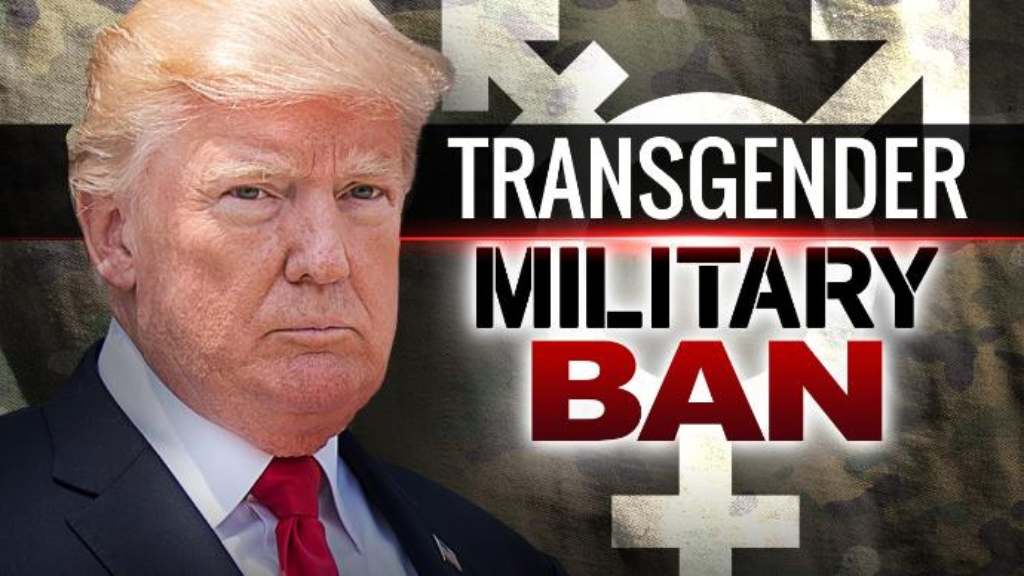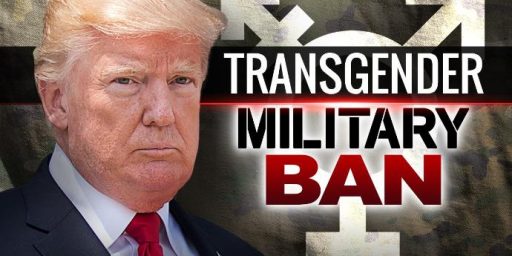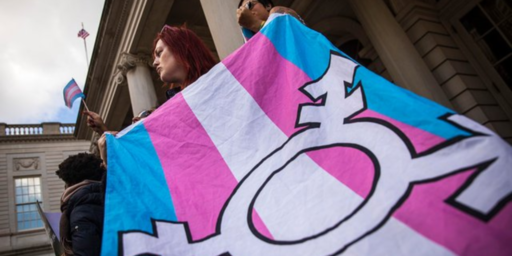Supreme Court Lifts Injunction Barring Trump’s Transgender Military Ban
In what amounts to a setback, the Supreme Court has lifted an injunction barring the Trump Administration's ban on transgender service in the military to go forward pending further legal proceedings.

Ever since August 2017, President Trump, in what seems for all the world to be an effort to satisfy the evangelical Christian wing of his base, has been trying to reverse the policy change that had been put in place by the Obama Administration in 2016 that allowed transgender troops to serve openly and directed the Pentagon to draft policy changes that would put that policy into place. The Pentagon was still studying the issue when, with no apparent advance notice and apparently no consultation with his military advisers, President Trump announced via Twitter that he would be issuing an order barring transgender troops from serving in the military. This clearly caught the Pentagon by surprise and caused the Defense Department at the time to make clear that the policy would not be changing immediately based solely on Presidential tweets. Despite the fact that polling at the time most Americans opposed the President’s announced policy, it seemed fairly apparent that the President would not be deterred from the policy change, and eventually, Trump finally signed a formal order implementing the new policy in late August. That Order though gave some latitude to the Defense Department to decide how to implement the policy change. In response, Secretary of Defense Mattis announced that a panel would be established to discuss how to implement Trump’s order and what impact it should have on those service members who came out of the closet in reliance on the announced change in policy last year. While some at the time insinuated that Mattis was defying Trump’s ban, it was clear that this was not the case.
In the meantime, lawsuits were filed against the ban both before and after the formal policy announcement from the White House, These lawsuits alleged that the ban was unconstitutional and that it violated the rights of members of the military who had come forward in reliance on the Obama Administration’s policy change due to the fact that it would punish them for acting in reliance on that change. In October 2017, Judge Colleen Kollar-Kotelly of the U.S. District Court for the District of Columbia issued a ruling barring the enforcement of Trump’s order and ordering the Defense Department to continue operating under the order issued by former President Obama in the summer of 2016. This was quickly followed by a ruling by Judge Marvin Garbis of the U.S. District Court in Maryland who issued an order substantially similar to Judge Kollar-Kotelly’s that also barred enforcement of the Administration’s order and compelled the Defense Department to continue operating under the pre-existing Obama era policies.
It was in response to those rulings that the Trump Administration issued a revised ban that purported to cure the defects that led to the adverse rulings against the original order. Notwithstanding these claims by the Administration, the new policy was substantially similar to the one that had been put in place last summer and rejected by two Federal Court Judges. As James Joyner noted at the time, for example, the new policy “contradicts the advice of all the sitting service chief and the only serious DOD-funded study on the matter.” This specifically included a RAND Corporation study that concluded there would be no adverse impact from allowing transgender troops to serve openly, something that had already been confirmed by the experiences of several American allies such as the United Kingdom, France, and Israel, all of whom allow transgender troops to serve openly. Because of this, it was apparent that the new policy was as unconstitutional as the earlier version. This past April, a Federal Court Judge in Washington State agreed with that assessment and issued a ruling barring the enforcement of the new policy.
These three rulings are all in various stages of appeal before the U.S Court of Appeals for the D.C. Circuit, the Court of Appeals for the Fourth Circuit, and the Court of Appeals for the Ninth Circuit. Just prior to Thanksgiving, though, the Justice Department filed pleadings with the U.S. Supreme Court asking the Justices to bypass all three of these courts and take up the issue on a direct appeal from the respective District Courts. In a short ruling that does not go into significant detail regarding the legal reasoning behind it, the Supreme Court has ruled that the Trump Administration can proceed to enforce its announced ban on transgender members of the military from serving openly, dealing opponents of the ban a setback in what had been until now a successful series of challenges:
WASHINGTON — The Supreme Court on Tuesday revived the Trump administration’s policy of barring most transgender people from serving in the military. In a brief, unsigned order, the justices temporarily allowed the ban to go into effect while cases challenging it move forward.
The vote was 5 to 4, with the court’s five conservative members in the majority and its four liberal members in dissent.
The administration had also asked the justices to hear immediate appeals from trial court rulings blocking the policy. The court turned down those requests without comment.
The policy, announced on Twitter by President Trump and refined by the defense secretary at the time, Jim Mattis, generally prohibits people identifying with a gender different from their biological sex from military service. It makes exceptions for several hundred transgender people already serving openly and for those willing to serve “in their biological sex.”
Challenges to the policy have had mixed success in the lower courts. Trial judges around the nation issued injunctions blocking it, and the United States Court of Appeals for the Ninth Circuit, in San Francisco, is expected to rule soon on whether to affirm one of them.
On Jan. 4, the United States Court of Appeals for the District of Columbia Circuit vacated a third injunction, that one issued by Judge Colleen Kollar-Kotelly, a federal trial judge in Washington. The appeals court said its ruling was “not a final determination on the merits.” But it handed the administration at least a provisional victory.
The Supreme Court granted stays of two other injunctions, issued by Federal District Court judges in California and Washington State, both in the Ninth Circuit.
Solicitor General Noel J. Francisco, representing the administration, had argued that the stays were needed to address a troubling phenomenon.
“It is with great reluctance that we seek such emergency relief in this court,” Mr. Francisco wrote. “Unfortunately, this case is part of a growing trend in which federal district courts, at the behest of particular plaintiffs, have issued nationwide injunctions, typically on a preliminary basis, against major policy initiatives.”
“Such injunctions previously were rare, but in recent years they have become routine,” he wrote. “In less than two years, federal courts have issued 25 of them, blocking a wide range of significant policies involving national security, national defense, immigration and domestic issues.”
Mr. Francisco did not ask the justices to address a separate injunctionfrom a federal trial judge in Maryland, but the Supreme Court’s action on Tuesday will presumably cause lower courts to stay that one, too.
Advocates for transgender rights welcomed the court’s decision not to hear immediate appeals from trial court rulings blocking the policy.
“In declining to hear these cases, the Supreme Court saw through the administration’s contrived efforts to gin up a national crisis,” said Jennifer Levi, director of the Transgender Rights Project of GLBTQ Legal Advocates & Defenders.
“Unfortunately,” she added, “the court’s stay of the lower courts’ preliminary orders means that courageous transgender service members will face discharges while challenges to the ban go forward. The Trump administration’s cruel obsession with ridding our military of dedicated and capable service members because they happen to be transgender defies reason and cannot survive legal review.”
The Supreme Court’s rules say it will review a federal trial court’s ruling before an appeals court has spoken “only upon a showing that the case is of such imperative public importance as to justify deviation from normal appellate practice and to require immediate determination in this court.”
In a separate brief, Mr. Francisco wrote, “This case satisfies that standard.”
“It involves,” he wrote, “an issue of imperative public importance: the authority of the U.S. military to determine who may serve in the nation’s armed forces.”
(…)
[L]awyers for current and prospective members of the military challenging the policy said there was no need to upend the status quo while the case proceeded.
“Transgender people have been serving openly in all branches of the United States military since June 2016, including on active duty in combat zones,” their brief said. “Transgender individuals have been permitted to enlist in the military since January 2018.”
“The government has presented no evidence that their doing so harms military readiness, effectiveness or lethality,” the brief said.
The hundreds of people grandfathered in under the new policy, the brief added, “cannot be squared with the government’s claims of urgency to eliminate all other transgender personnel.”
As I said, the Courts order on this matter is short and does not get into any significant reasoning as to why the Justices decided this case the way they did, although it’s worth noting that the case appears to have fallen along the expected ideological breakdown. Chief Justice Roberts, along with Justices Thomas, Alito, Gorsuch, and Kavanaugh all lined up to remove the injunction while Justices Ginsburg, Breyer, Sotomayor, and Kagan, all dissented from the opinion. What we don’t know for sure is why the outcome turned out the way that it did. The natural conclusion, of course, is that the Justices in the majority determined that an injunction against the policy was unwarranted because the Plaintiffs in the case, which consist of current members of the military who had come forward as transgender in reliance on the Obama Administration’s change in policy, did not meet the legal criteria for such an injunction. These include suffering an irreparable injury for which there is no other adequate remedy, a showing that the balance of the equities in the case come down in their favor, and that they have a likelihood of success on the merits. If this is the approach the Court took, then it’s likely that it was the final criteria, the likelihood of success, that caused the Court to rule the way that it did. While I don’t necessarily agree with the argument, the Administration has argued in the past that the President’s authority as Commander in Chief gives him significant discretion in establishing rules for the military, even when those rules would appear to violates other provisions of the Constitution. In any case, if this is the basis on which the Justices ruled, then it does not bode well for the Plaintiffs in the long run since it indicates that, at least, so far, the Justices are not convinced that they’ve presented a sufficient case to support their position.
Alternatively, the Justices may have focused their ruling on the other issue that the Federal Government presented in their appeal of the injunction, specifically the authority of the District Courts to grant nationwide injunctions. As a general rule, when a Court rules in a case, including on the granting of an injunction, the ruling only applies to the parties before the Court. With increasing frequency, though, and especially during the first two years of the Trump Administration, we have seen District Court Judges issue injunctions with nationwide applicability. In some cases, these injunctions are arguably necessary due to the issue presented by the case, but many legal scholars and the Justice Department itself have argued that the District Court Judges have been exceeding their authority in the scope and breadth of the injunctions they have granted. It’s possible that the Court was basing its ruling on this part of the Trump Administration’s appeal. If that’s the case, then it means that the Court has not really addressed the merits of the underlying case, leaving that matter for the courts below to work out.
This particular now returns to the Ninth Circuit for further review, and the other cases continue to work their way through the system. However, it does not appear that the Justices are inclined to rule on the merits of the underlying case at this time. This means that it will be some time, perhaps as much as a year or longer before the Justices have an opportunity to rule on the merits of the case. In the meantime, with the injunction lifted, how the new policy proceeds, and what it means for those who already came forward after the Obama Administration changed existing policy in 2016, remains somewhat up in the air and depends on how the Administration and the Pentagon want to proceed.




Cadet Bone Spurs deciding that some heroes won’t be allowed to serve, because he thinks they are yucky.
What a piece of shit he is.
A phrase in Steven Pinker’s book “The Better Angels of Our Nature” succinctly explains the type of people who support bans like this: Morally retarded.
Actually we do; it’s just that our assessment will inferentially based sources. Still in all, faith has the same sort of metaphysical assurance as empiricism, and the decision was as short as it was because “we’re the Supreme Court and what we say goes” lacks the gravitas that this kind of a move requires. The author of the opinion went with “it’s better to say nothing and be thought a fool.” Wise choice.
A coward deciding the fate of brave people…lovely…
“the Pentagon announced today that it would immediately begin discharging transgender soldiers, marines, sailors, and airmen, after a brief, 729-day administrative review of the situation.” 😛
@Daryl and his brother Darryl:
Aw, we should all be terribly grateful that Trump’s very serious and debilitating condition prevented him from serving in the armed forces, but did not, happily, curtail his 1970s career of clubbing, golfing, skiing, and screwing.
While I’m sure the Trump administration is all about trans folks being icky, and that is their real rationale for this, what are the medical consequences of a trans person not having access to hormones?
We don’t let diabetics serve, as a general rule, as their health needs constant maintenance and medication. I assume that this is ultimately a supply line problem — if they cannot get medication, they are significantly disabled and can die.
Not knowing much about transfolks, and how an interruption of their treatment is going to affect them, I think there is a reasonable question about whether they should be able to serve, just as there is about diabetics, and any other medical condition. (My layperson’s expectation is that they either start or stop growing beards and become kind of cranky, and that this isn’t a big deal, but my layperson’s expectation is barely informed)
I have no faith that this administration is reasonably asking those questions though.
(Also, I don’t see why diabetics cannot serve away from the front lines, but there may be good reasons that I don’t understand. Is it because insulin has to be refrigerated and any position can become front line if everything goes to hell?)
@Gustopher:
Physically, none in the case of transgender women. Transgender men may lose some muscle mass due to lack of testosterone. Psychologically, it depends on the stage of transition, the length of time in hormone replacement therapy, and the individual person.
The good news is there are long-term hormone delivery systems (pellets) that last for several months.
Beards may grow slower without testosterone, but they won’t stop growing. Ditto body hair. That’s why transgender women typically undergo electrolysis or other methods of permanent hair removal.
@Kathy: In other words, there’s no good reason for this ban…it’s purpose is based on simple prejudice and bigotry…
It’s a great thing about the present administration that they maintain such a target-rich environment. For someone interested in a less even-handed treatment than Mr Mataconis’ Original there is balloon-juice dot com where Adam Silverman has a lengthy article with Tammy Duckworth’s statement (“…when I lay bleeding to death I didn’t care if the troops risking their lives to save me were gay, straight, trans — etc…”) and a long twit-threat from a former SEAL Kristin Beck absolutely destroying any anti-trans arguments. Truculently. As it deserves.
On the other hand: Ick! We need the military to be a safe space!